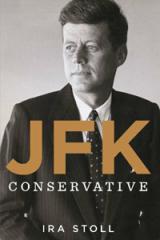 James Piereson documents in a National Review book review some facts that contradict the popular narrative of John F. Kennedy’s liberal record.
James Piereson documents in a National Review book review some facts that contradict the popular narrative of John F. Kennedy’s liberal record.
JFK was not only a conservative Cold Warrior but also a fiscal conservative and a tax cutter. He believed in efficiency in government and in cutting wasteful spending. He came to office pledging to balance the federal budget over the life of the business cycle. His top domestic priority in 1963 was a general reduction in personal and corporate income taxes to spur consumer spending and to promote faster economic growth. He proposed to cut the top marginal tax rate from 91 to 65 percent and the lowest rate from 20 to 14 percent, and also to reduce long-term capital-gains taxes from 25 to 19.5 percent. He pushed this proposal (a version of which was passed into law in 1964) against the opposition of such liberals as John Kenneth Galbraith, who called for more government spending to stimulate growth. The payoff from JFK’s policy came in the mid 1960s, when the U.S. economy grew at an average of more than 6 percent per year.
Many of Kennedy’s central ideas were later picked up by Ronald Reagan and other conservatives, but they were generally abandoned by the liberal Democrats who came along in the 1970s and 1980s.
Still, Piereson is not willing to go as far as author Ira Stoll, who titled his new volume JFK: Conservative. Piereson rejects the conservative label for Kennedy, labeling the 35th president as a type of liberal who has long since disappeared from the American scene.
JFK appears more conservative to us today than he appeared to his contemporaries because liberalism moved so far to the left in the years after he was killed.


